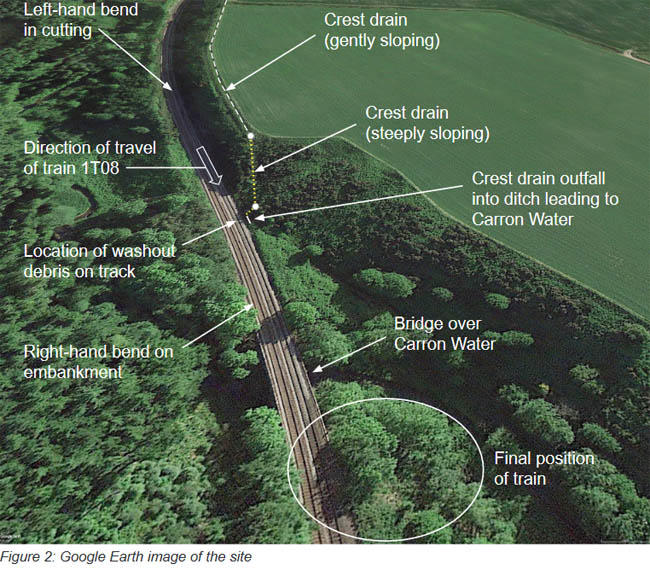Rail investigators have insisted their probe into last year’s fatal derailment at Carmont, near Stonehaven in Aberdeenshire, will be ‘detailed and fully independent’, following criticism from a rail union.
The Rail Accident Investigation Branch (RAIB) has published its interim report into the incident last August, in which three people died.
The report states that the train derailed after colliding with stones washed out onto the track from a gravel-filled crest drain and from the adjacent ground, following ‘unusually heavy rain’.
It states that it is possible that surface water flows, before the day of the accident, had been sufficient to dislodge gravel from small areas of the gravel-filled drain, sufficient to be seen in the area affected, but with insufficient material washed down for this to be apparent at track level.
The report adds: ‘The lack of an effective drainage inspection regime meant that any such indications of future problems upslope of [the area of in question] would not have been detected.’
Following publication of the report, the RMT union said it ‘believes that the RAIB seems to be taking Network Rail’s commitments on expertise at face value’.

Source: RAIB interim report
A spokesperson for the RAIB said: ‘The RAIB is in the process of conducting a detailed and fully independent investigation. As our interim report states, we are still in the process of collecting and carefully examining evidence in a number of key areas. The results of RAIB’s investigation and safety recommendations will be published later this year.’
The RMT’s general secretary, Mick Cash, also criticised infrastructure operator Network Rail. He said: ‘The tragic loss of life and damage at Carmont sets out that there are clear deficiencies in Network Rail’s approach to the effects of severe weather and its effects on the ageing rail infrastructure. Network Rail must learn from this incident and take the necessary steps to ensure that they are preventing incidents from happening.
‘That means a robust and regular inspection, maintenance and improvement programme that means our railway infrastructure is fit for a future where extreme weather may become more regular and more challenging. We need a well-maintained railway that will need a hands-on approach to maintenance and improvements and not just leaving matters to predictions and forecasts.’
Drivers union ASLEF welcomed the report. Kevin Lindsay, ASLEF's organiser in Scotland, said: 'Blame for the accident has been laid firmly at the door of Network Rail for failing to maintain the area around the track. It was the landslip – the debris washed onto the track – which caused the train to derail, with the subsequent loss of life, injuries, and catastrophic consequences.'
Network Rail did not respond to the unions' comments directly but chief executive Andrew Haines said: ‘We remain absolutely committed to learning lessons from the tragedy last summer that cost the lives of Brett McCullough, Christopher Stuchbury and Donald Dinnie. We welcome RAIB’s interim report and we continue to cooperate with all ongoing investigations as we seek to understand what happened.
‘We are being led by world-renowned experts as we tackle one of our biggest challenges, adapting our transport system to cope with the long-term changes in weather in the face of a rapidly changing climate.’
Register now for full access
Register just once to get unrestricted, real-time coverage of the issues and challenges facing UK transport and highways engineers.
Full website content includes the latest news, exclusive commentary from leading industry figures and detailed topical analysis of the highways, transportation, environment and place-shaping sectors.
Use the link below to register your details for full, free access.
Already a registered? Login